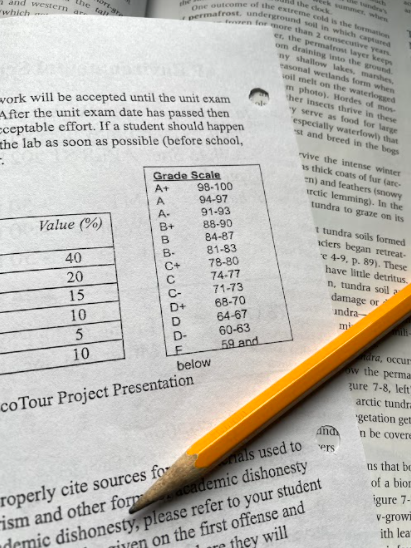We need to change the way we think about grades

The Carroll High School grading scale.
Since we begin our education careers in kindergarten and preschool, we are taught that the work we do in school matters, and we need to put in effort in order to ensure we get good grades so that we can have prosperous futures.
Oftentimes students at the top of their class are seen as extremely intelligent people who are likely to have positive, successful futures. I don’t doubt this at all, but where does that place the students on the opposite side of the spectrum; those with lower grades?
The way I see it, grades aren’t necessarily based on intelligence but more so on work ethic, so why does the system make students who don’t have top grades feel as if they aren’t smart? While this way of thinking could be used as a motivation for some, it’s more of a punishment.
Through my own experience, the schooling system is set up so that students must strive to get good grades with disregard as to whether or not they actually understand the content of a class.
They can regurgitate information on a quiz or test and that does give somewhat of an indication of how well they know the material, but many times I have gotten done with testing and immediately forgotten everything on it or I simply memorized what I was told I needed to know instead of actually being able to comprehend that information and why it is important, which is the entirety of the reason we have to go to school in the first place; to learn and to be able to apply that knowledge to our lives in the adult and working world.
How are we supposed to do that in the type of environment where it seems as if the only thing that matters to adults are the scores that we get?
This is not a logical way to get most children to truly learn. It is, rather, destroying their self-esteem and not allowing them to see their potential before they even become adults.
Many of the most intelligent people I have met throughout my life often demean themselves for getting low scores on assignments or having low grades overall, and I have witnessed other people calling them negative things as well.
If a thought is reinforced enough, we begin to truly believe it, and therefore our actions are affected by those thoughts. Reinforcing the idea that unsatisfactory grades equals unintelligence just supports the notion that someone may already have within their subconscious that they cannot do well in school even if they tried; so why would they try?
Even students who do well in school can be affected by this way of thinking; we place so much emphasis on how we perform in school and there is a large amount of pressure that comes along with that. If you place your self-worth upon your grades, then what happens to that image when the stress becomes too much and you slip?
Intelligence itself manifests in a wide variety of different forms. According to developmental psychologist Howard Gardner’s 1983 theory of multiple intelligences, there are eight types of intelligences and multiple other possibilities. Everyone is versed in each differently, excelling in some and lacking in others. The way that we view and measure intellect is limited compared to the full range of abilities that exist.
Of course, there will always be students who simply lack the motivation or desire to put in much effort towards their schooling and those who have other elements impeding their ability to do so, such as mental health or things going on within their home lives, but changing the way that we as a collective student and teacher body view grades and how we treat those who aren’t immediately “successful” could possibly make the grade performance stigma less affecting for some of our peers.
Life is more than school. Yes, we must take this time to properly prepare ourselves for the future and do what is necessary to be able to achieve what we want, but that is not all that there is.
Your grades are not a reflection of who you are nor your capabilities, and no matter what your school experience has been like or what your grades are I am proud of you and you should be proud of yourself.

Peyton Holsworth is a junior at Carroll. This is her first year writing for The Charger Online. She is looking forward to working with the newspaper staff...




